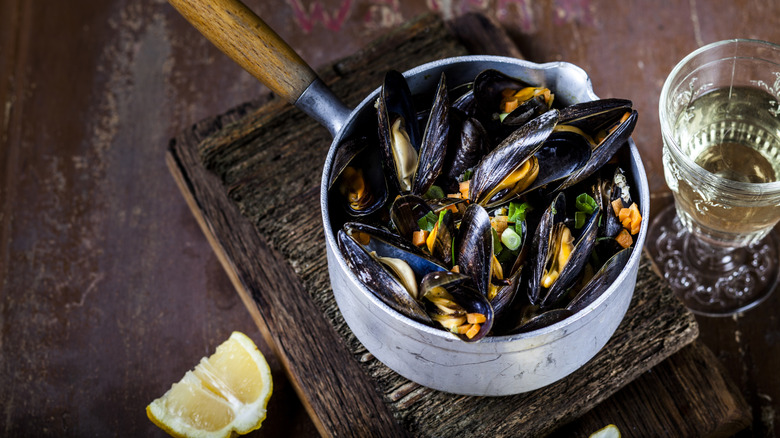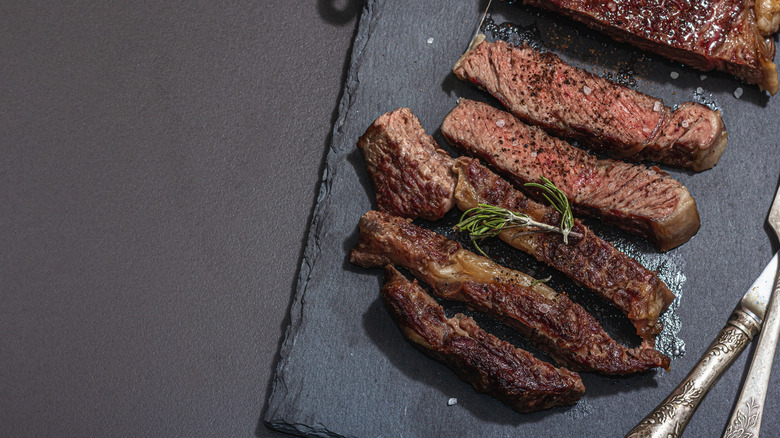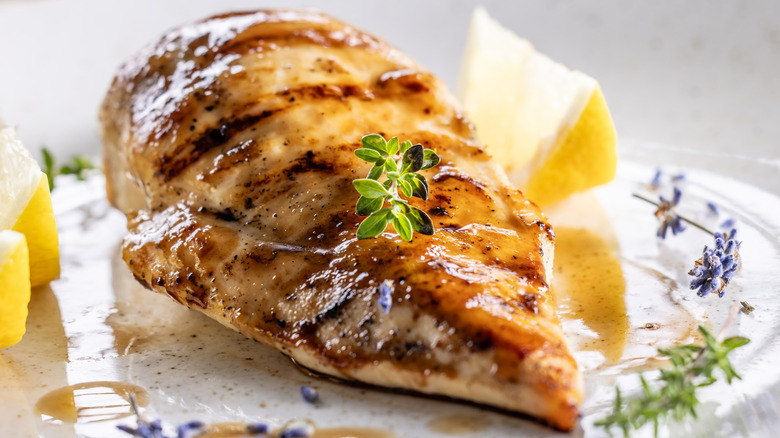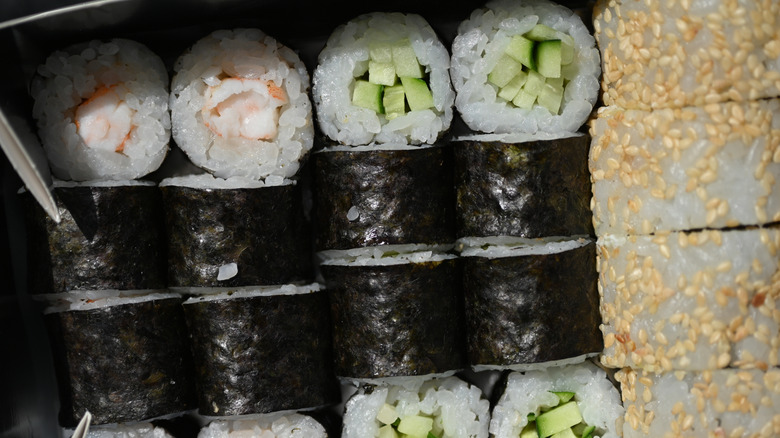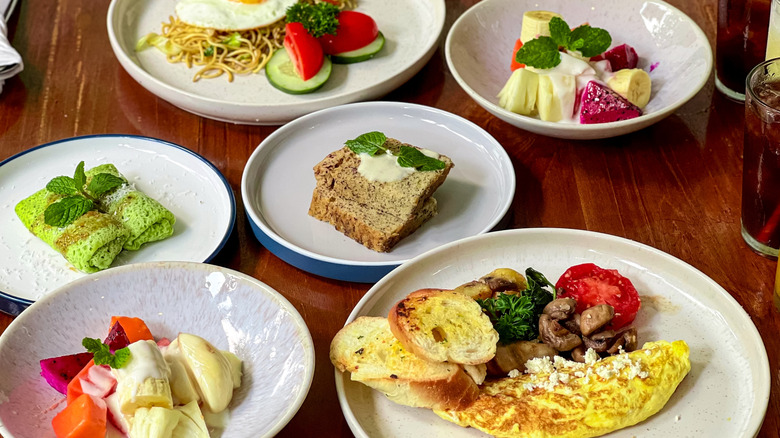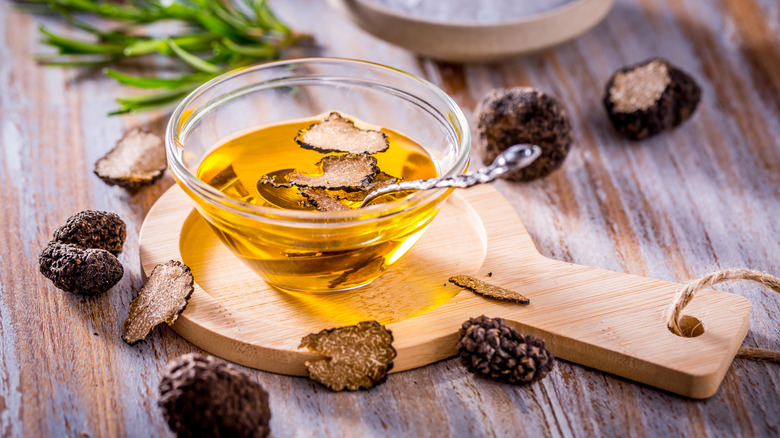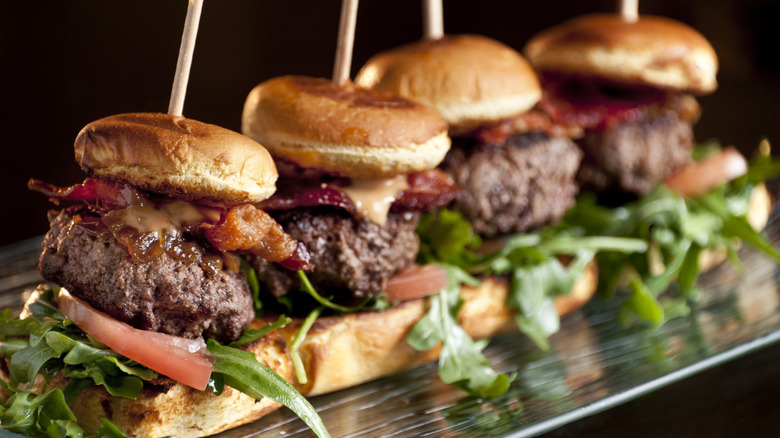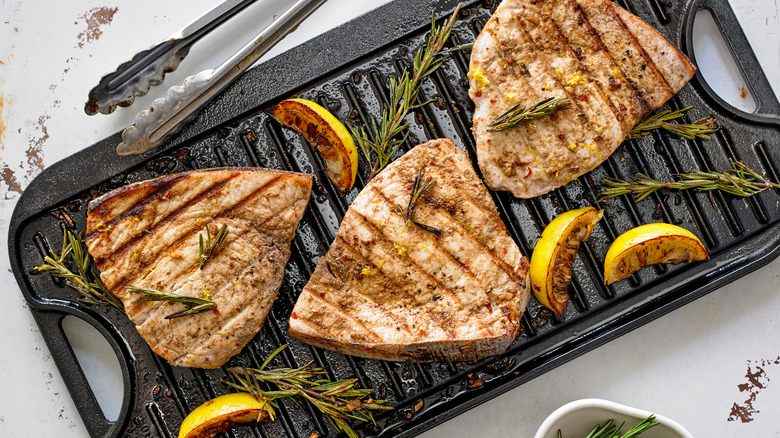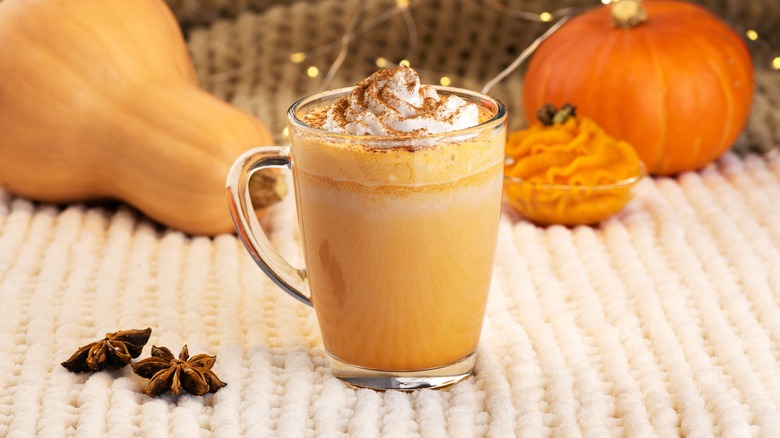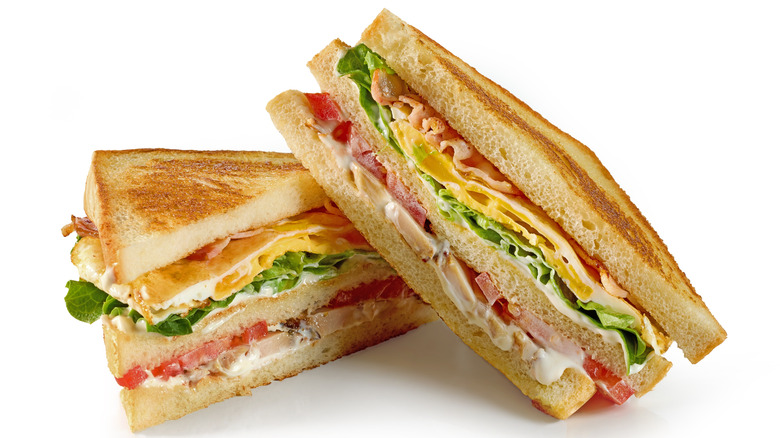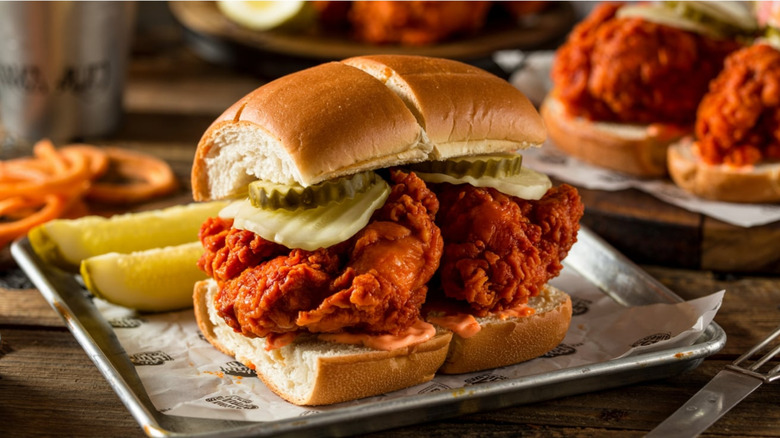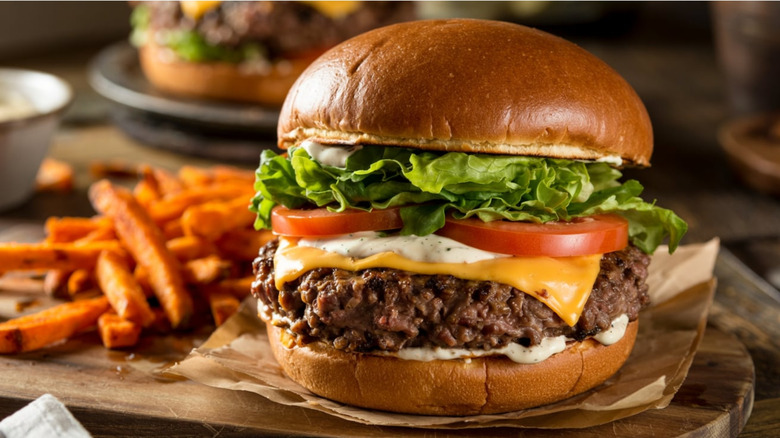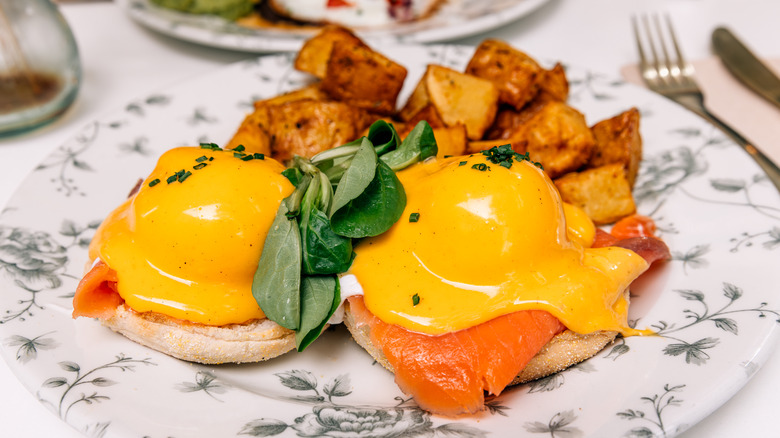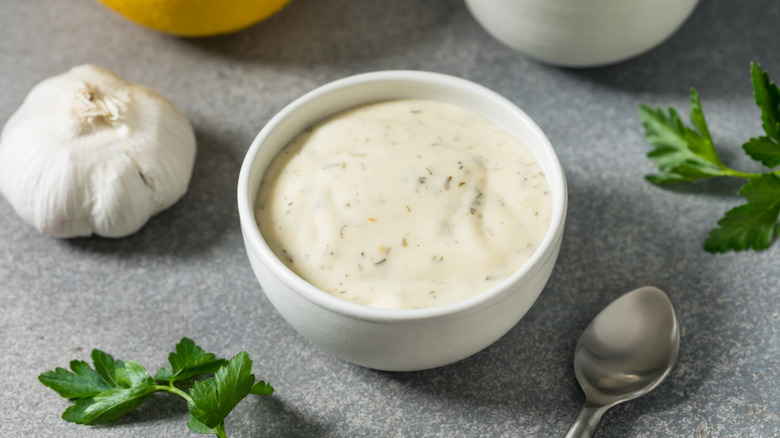Listen To Anthony Bourdain And Avoid Ordering These Dishes From A Restaurant
We may receive a commission on purchases made from links.
Among the more influential culinary superstars to ever walk the planet was the late Anthony Bourdain. Through books, like his iconic memoir "Kitchen Confidential: Adventures in the Culinary Underbelly," and television shows, like "No Reservations" and "Parts Unknown," Bourdain did more than just entertain us. This chef, author, television host, and visionary educated us in the ways in which food is inherently political, helping us navigate the private and professional kitchens of people from countries across the globe.
One of the topics that Bourdain was infinitely curious about — and would spend a lot of time discussing — was the restaurant world. Not only did he shed light on the often dark and dysfunctional lives professional chefs lead, he made it something of a personal mission to enlighten people of the inner workings of commercial kitchens. This extended to topics like what dishes he would and would not order from a restaurant and why. From mussels and bargain sushi to club sandwiches and anything served with hollandaise sauce, the following are the restaurant dishes Anthony Bourdain would always avoid when dining out.
Mussels
While often considered a delicacy, shellfish is a food you may not want to take chances with at a subpar restaurant. Anthony Bourdain was a stickler about this one, especially when it came to mussels. In his trope "Kitchen Confidential: Adventures in the Culinary Underbelly," Bourdain stated unequivocally that unless he was well-acquainted with a chef or a restaurant's storage and cooking processes, he would avoid mussels like the plague.
Mussels are notoriously perishable and susceptible to a host of contaminants, including salmonella, E. coli, norovirus, vibrio, and lots of biotoxins. For this reason they must be safely stored, namely in the refrigerator within containers punctuated with holes that allow for drainage and airflow. What's more, they should be carefully inspected before cooked to ensure they're still alive before they are tossed into a pot and fed to customers.
As Bourdain notes, most restaurants aren't this careful and chances are you're taking some significant risks by eating the mussels on special. If you are determined to eat mussels, try purchasing them fresh from a reputable seafood purveyor and cooking them at home. Preparing mussels is easier than you might think and infinitely safer. Just make sure the mussels have opened after they're cooked to guarantee they were alive before they were prepared.
Well-done steak
Professional chefs understand there is a right and wrong way to prepare any cut of meat, especially a choice steak. For most cuts of beef, this tends to be a medium-rare doneness. At this stage the meat is juicy, tender, and its flavor is showcased in its full beefiness. Any chef worth their salt will be at least moderately perturbed when a customer orders their steak well-done, but Anthony Bourdain took this disdain to a whole new level, famously saying "It hurts me ... Anyone who's that indifferent to food is problematic for me," in an interview with Town & Country.
He goes further in an article written for The New Yorker, explaining that if you order a steak well-done at a restaurant, you might just well be served the lowest quality specimen of beef money can buy. Restaurants are notoriously careful to ensure that nothing goes to waste, even the most sinewy and chewy cut that is likely past its prime and would otherwise be destined for the garbage. He calls this the "save for well-done" cut, which was reserved by the chef for just this occasion. As he puts it "the philistine who orders his food well-done is not likely to notice the difference between food and flotsam."
Chicken
The next time you see a chicken dish on the menu at a restaurant, you might want to consider Anthony Bourdain's advice before ordering it. Bourdain was highly critical of chicken for a number of reasons. In his iconic The New Yorker article, he was quick to point out that while most people think pork is unclean, chickens are infinitely more unsanitary. Commercially-grown birds are crammed together in suffocating conditions where they are susceptible to injury and disease.
He goes on to point out that chickens are also breeding grounds for salmonella and are often the culprits of foodborne illness outbreaks in commercial kitchens. The CDC confirms this, stating that salmonella is the most likely pathogen to cause a foodborne illness and that chicken represents a significant threat, with one in 25 packages of the meat sold in grocery stores being contaminated with the bacteria.
But, perhaps even more importantly from Bourdain's perspective, chicken is boring. As he notes in "Kitchen Confidential: Adventures in the Culinary Underbelly" ... "Chefs see it as a menu item for people who don't know what they want to eat."
Bargain sushi
We aren't sure that it should take Anthony Bourdain to tell us not to buy bargain sushi, but if you are still tempted to get that day-old sushi from the grocery store, you may want to reconsider this move. According to People, Bourdain once stated, "I can't imagine a better example of Things To Be Wary Of in the food department than bargain sushi."
While sushi is generally seen as safe to consume if prepared properly, there are some inherent risks to eating it, especially if you're pregnant or immunocompromised. One of the biggest issues with sushi is the risk of parasites, namely tapeworms, but it can also harbor bacteria and viruses. This risk is minimized by flash-freezing the fish at sub-zero temperatures. That said, once sushi has been assembled, it's highly perishable and should be consumed within 24 hours of preparation for best quality and safety.
If you have a hankering for sushi, it may be worth spending more to get it made fresh — or you can make it yourself. One simple hack for doing so without a mat is to use ice cube trays to assemble homemade sushi. This allows you to customize your sushi and to be selective with the quality of fish you purchase for this purpose.
Brunch
While customers may love that discount Sunday brunch with bottomless mimosas and bloody marys, Anthony Bourdain despised them. On an appearance of "The Tonight Show Starring Jimmy Fallon," Bourdain famously stated, "Brunch is just breakfast with an orange twist and a strawberry fan on it ... with a free glass of really crappy mimosas."
He elaborates on this in his op-ed for The New Yorker, noting that the "B" word is something that is the bane of every chef's existence. Chefs find it demoralizing and tedious to prepare. What's more, according to "Kitchen Confidential: Adventures in the Culinary Underbelly," many restaurants give management the day off on Sundays. This means the kitchen staff is highly under-supervised, which may or may not be a problem when it comes to the quality and safety of your brunch meal.
Lastly, Bourdain asserts that brunch is essentially a dumping ground for all of the leftovers a restaurant has from the Friday and Saturday rush. It's a way for a restaurant to empty the walk-in and get rid of less than pristine inventory before it goes into the garbage. If you really want brunch, you might just want to whip it up yourself.
Truffle oIl anything
When it comes to truffle oil, Anthony Bourdain was unequivocally not a fan. He had some very choice words for the stuff in an interview on "The Tonight Show Starring Jimmy Fallon," where he noted that if you find yourself in a restaurant serving truffle oil, this is an obvious red flag that something has gone horribly wrong in your life.
Bourdain isn't the only chef to despise truffle oil. Many consider it an abomination that should be avoided at all costs. The biggest issue is that truffle oil doesn't typically actually contain real truffles in it, at least not in any notable quantity. Most truffle oil is made with a synthetic compound, known as 2,4-dithiapentane, that is a facsimile of the aroma and flavor of truffles. They can quickly overpower a dish and have a somewhat synthetic aftertaste that lingers unpleasantly in the mouth. And, most chefs think they desensitize consumers to actual truffles, which can be a delicacy.
If you do choose to consume truffle oil, it is important to purchase a quality one and to use it sparingly. La Tourangelle offers a good black truffle oil that can be a nice finishing touch or garnish for pasta, pizza, or potatoes. That said, moderation is key. This is the perfect example of a less-is-more approach being crucial.
Kobe sliders
One of the greatest delicacies in the world is authentic Japanese Kobe beef. This meat is incredibly hard to find in the United States because of its limited production and exclusivity. A majority of the Kobe beef that is exported to America ends up in high-end restaurants that have earned the appropriate certification to sell this meat. For this reason, when a restaurant advertises Kobe sliders on the menu, this should immediately raise some red flags in your consciousness.
In his interview with Town & Country, Anthony Bourdain goes even further, stating Kobe sliders are a "clear and present danger," which may seem hyperbolic, but he was always known for being a straight shooter when it came to his opinions about food. In his estimation, people who order Kobe sliders aren't actually interested in appreciating the delicacy of real Kobe beef for what it is. All they care about are bragging rights and advertising their deep pockets to their buddies.
If you truly want to experience Kobe beef, order a steak at a fine dining establishment that knows what they are doing and can prepare it appropriately. Real Kobe beef should be enjoyed in moderation, 1-2 ounces at a time. Because it is so highly marbled, it can almost have a buttery quality to it, making it too rich to consume more than that at any one sitting.
Swordfish
Anthony Bourdain had some strong opinions about eating fish at restaurants. Early in his career, he was quite adamant about not eating it on Mondays because it probably wasn't fresh and its quality was likely compromised. He later rescinded this advice in an interview with Business Insider, stating that the world had changed and not only do more people eat fish, consumers know what good seafood smells and looks like. As a result, the options available are more diverse and fresher than ever.
That said, there was still one type of fish he would never eat at a restaurant: swordfish. In "Kitchen Confidential: Adventures in the Culinary Underbelly," he noted that his own seafood purveyor had witnessed a number of specimens that were infested with 3-foot-long parasitic worms. It is worth mentioning that according to The Environmental Literacy Council, a majority of the parasitic worms often present in swordfish are harmless to humans — if the fish is properly prepared. This includes removing the worms before cooking and ensuring the fish reaches a safe minimum internal temperature of 145 F. Additionally, wild-caught swordfish is more likely to be infested by parasites than its farmed counterpart.
Perhaps more concerning is the fact that swordfish can be quite high in mercury content, which is problematic for women who are pregnant or breastfeeding and for young children. Swordfish can also be an environmental issue when sourced internationally — however, when caught domestically it's generally considered sustainable.
Gimmicky menu items
For a chef who loved the novelty of travel and experiencing edible delicacies across the globe, Anthony Bourdain was extremely suspicious of food trends and gimmicks. His opinions on menu items that were trying to be clever for the sake of being cute or because something happens to be popular at the moment would infuriate him.
Among the most egregious trends to Bourdain were pumpkin spice anything and fancy beverages that were dubbed "artisanal" or came in kooky colors, like the Unicorn Frappuccino at Starbucks. He was also famously suspicious of vegetarians, who he called "treasonous," and those who treated gluten like "an equivalent of Al Qaeda."
Lastly, he was quick to discount what he called "overexposed foods," like a cheeseburger tucked into a Krispy Kreme donut rather than a traditional bun. We suspect a kale smoothie or cauliflower pizza likely would have sent him running out of a restaurant screaming at the top of his lungs.
Club sandwich
If you have ever wondered why a club sandwich has three slices of bread, you're in good company. Anthony Bourdain often contemplated this fact and had a serious aversion to this abomination of the culinary world. On "NPR" he once referred to the club sandwich as "a satanic invention" and suggested that the third slice of bread on a club sandwich was added to "sap our will to live by ruining our sandwich experiences through 'tectonic slide."
Bourdain was much more fond of simple flavors and construction when it came to sandwiches. His favorite sandwich was purportedly a basic 5-ingredient recipe that was featured in his 2016 cookbook, "Appetites." This sandwich was based on a similar dish he enjoyed while traveling to São Paulo, Brazil. The sandwich featured thin slices of provolone cheese and mortadella stacked onto a sourdough bun or Kaiser roll smeared with mayonnaise and Dijon mustard. The key to the deliciousness of this sandwich was frying the mortadella and melting the cheese on top of it before adding it to the bun. The crispy meat and gooey cheese created a textural masterpiece and savory flavor that the late Bourdain found irresistible.
Nashville hot chicken
Known as "Music City," Nashville may best regarded for iconic music venues like the Grand Ole Opry and the Ryman Auditorium, but it's also considered to be a foodie paradise. While Anthony Bourdain loved the music, vibe, and hip cuisine of the city, there was one thing he sampled there that he couldn't get behind, Nashville hot chicken.
For the uninitiated, what makes this spin on a Southern-style fried chicken so unique is the incendiary glaze within which the meat is encased. It is made from copious quantities of cayenne pepper and chili powder that are combined with brown sugar and oil until thick and rich. The result is something Bourdain called "truly terrifying," suggesting that the dish was invented as some kind of perverted initiation ritual for an exclusive club. He famously stated, "Unless you've got three or four days to spend in a bathroom, I really advise against that," according to InsideHook.
A burger made with a brioche bun
When it comes to food, just because you can do something, doesn't mean you should. One example of this is the phenomenon of swapping a classic burger bun with an alternative type of bread, like a brioche bun. Anthony Bourdain was not a fan. Thrillist notably reports that the chef stated that when it comes to a burger "God is against the brioche bun."
We can't argue the point, as we too think putting a burger on a brioche bun is a terrible idea. The whole point of the bun is to act as a delivery vessel for a greasy burger. This means the bun should help absorb some of that fat so the meat can make it safely into your mouth. A brioche bun tends to be too delicate and will absorb the fat, making it great for French toast, but abysmal as an encasement for a burger.
Additionally, a brioche bun falls into a category of baked goods known as viennoiserie, which also includes croissants and pain au chocolat. Made predominantly from yeast-leavened dough (and think: eggs, butter, sugar, and occasionally milk), viennoiseries are characterized by their dominant sweet flavor and richness, which are not particularly well-suited to savory applications, like a burger or meaty sandwich.
Anything topped with hollandaise sauce
While Julia Child may have loved it and had a foolproof recipe for making it in a blender, hollandaise sauce was not among the ingredients Anthony Bourdain was fond of, especially on a restaurant menu. As he noted in "Kitchen Confidential: Adventures in the Culinary Underbelly," hollandaise sauce is notoriously perishable. Because it is an emulsification of egg yolks and butter, it has to be held at a precise lukewarm temperature to remain scoopable. This temperature happens to be the ideal breeding ground for pathogens, making hollandaise especially prone to causing foodborne illnesses, unless made-to-order, which seldom occurs at restaurants.
If you truly enjoy hollandaise sauce, it's perhaps best to consume it at home, where you can control the environment within which it is made and how long it's held. This also allows you to play with a classic hollandaise recipe and jazz it up. For example, red wine hollandaise is the perfect way to shake up eggs Benedict or jazz up a perfectly done, medium-rare steak.
Ranch dressing
Speaking of trendy foods, ranch dressing enjoys an almost cult-like following in America. People enjoy putting it on virtually everything, from salads and pizza to pretzels and chicken wings. Sadly, Anthony Bourdain was not a fan. While he may have enjoyed it in the privacy of his own home, he didn't appreciate it as an ingredient on a restaurant menu.
Bourdain felt that ranch dressing was often used as a crutch by restaurant chefs. It was an uninspired way of giving flavor to a dish without much thought or creativity behind it. Additionally, he suggested that it was somewhat indelicate, overpowering any other flavors in a dish and rendering them pointless.
When it came to condiments, Bourdain was far more likely to incorporate a classic French rouille into a dish. This crimson-hued emulsification of egg yolks with red peppers, garlic, saffron, lemon juice, and oil — which Bourdain often described as magical — is a common addition to seafood dishes, but can also be added to eggs or used as a spread for sandwiches.

